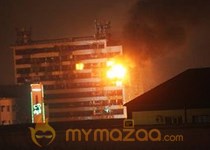A gun battle broke out early Thursday in the capital of Russia's North Caucasus republic of Chechnya, leaving at least three traffic police officers and six gunmen dead, authorities said. The fighting punctured the patina of stability ensured by years of heavy-handed rule by a Kremlin-appointed leader.
Security officials and the leader of Chechnya said gunmen traveling in several cars killed three traffic police at a checkpoint in the capital of the republic, Grozny. State news agency RIA-Novosti cited an unnamed law enforcement source as stating that five police officers were killed.
More than six hours after fighting broke out, Chechen leader Ramzan Kadyrov said six gunmen responsible for the unrest had been cornered and killed.
Although unrest is common across the North Caucasus, forceful security measures adopted by Kadyrov have spared Grozny significant violence for several years.
The Moscow-based National Anti-Terrorist Committee, a federal agency, said in a statement that after the attack on the traffic police, gunmen occupied a publishing house in the center of Grozny. It said security services, police and emergency services personnel surrounded the building.
Kadyrov said on his Instagram account, a social media website he regularly uses to issue public statements, that the traffic police officers were shot dead as they attempted to stop the cars carrying the gunmen.
An Associated Press reporter saw the multi-story publishing house building in flames early Thursday and heard the sound of heavy-caliber gunfire before dawn, several hours after the unrest erupted. The AP reporter also saw the body of someone in civilian clothing in the street near the publishing house as fighting was still ongoing, but it was not clear how and when the person had been killed.
An unverified video posted online showed what appeared to be a shell slamming into the already blazing publishing house building.
Life News, a news outlet believed to have links to Russian security services, cited law enforcement officials as saying about 15 people seized three cars late Wednesday in the village of Shalazhi and drove them to Grozny, some 50 kilometers (30 miles) away. Kadyrov said in his statement that the group of gunmen that took over the publishing house was composed of about five or six people.
The National Anti-Terrorist Committee said in its statement that a counterterrorism regime was imposed on the center of Grozny. That officially allows heightened security measures to be enacted and the announcement typically indicates the imminent use of heavy force to quash unrest.
Kadyrov said the situation was calm and that all essential public services would still be operating, but he urged Grozny residents to exercise caution.
"I ask residents in areas where (security) operations are being carried out to abide by safety measures, and not to go out onto the streets without cause or to go near their windows," he wrote. "All the talk about the city being under the control of the military is absolutely false."
Kadyrov said in a message posted several hours later that six militants were killed in the standoff at the printing house.
"Not one bandit managed to get out. I directly ran the operation myself," he wrote.
Kadyrov posted a picture showing the lower half of an apparently dead gunman lying beside a rifle, but it was not immediately clear if it showed one of the presumed killed gunmen.
The Kavkaz Center website, which serves as a mouthpiece for Islamic militant groups operating in Russia's North Caucasus, carried a link to a video message by an individual claiming responsibility for the attacks unfolding Thursday morning. The man in the video claimed to be operating under orders from Chechen Islamist leader Aslan Byutukayev, known to his followers as Emir Khamzat.
The video could not immediately be verified.
A few years after the collapse of the Soviet Union, Chechnya was plunged into a full-scale war when separatist rebels pursued independence for the republic. The violence was largely confined to that small republic, but rebels ventured into other parts of Russia.
A fragile peace settlement was reached with Moscow until 1999, when an insurgency movement increasingly inspired by radical Islamist ideas reignited the conflict. A bloody military crackdown succeeded by years of aggressive rule by Kremlin-backed leader Kadyrov has quietened the region, pushing unrest to troubled neighboring provinces.
Kadyrov is widely denounced for human rights abuses, including allegations of killing opponents. He has also imposed some Islamic restrictions on the region, including mandatory public headscarves for women.







